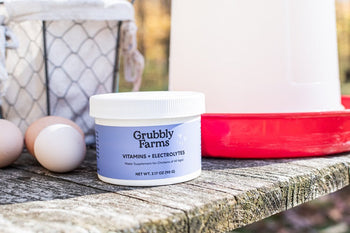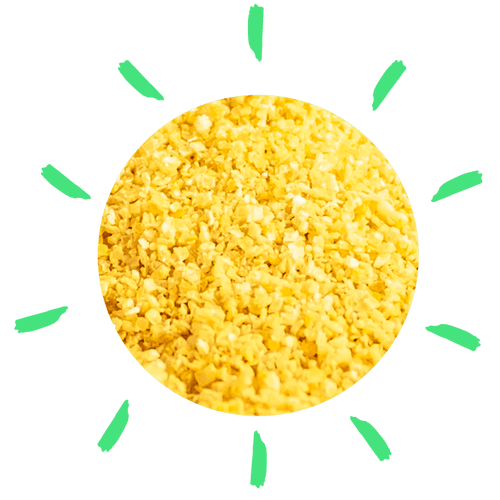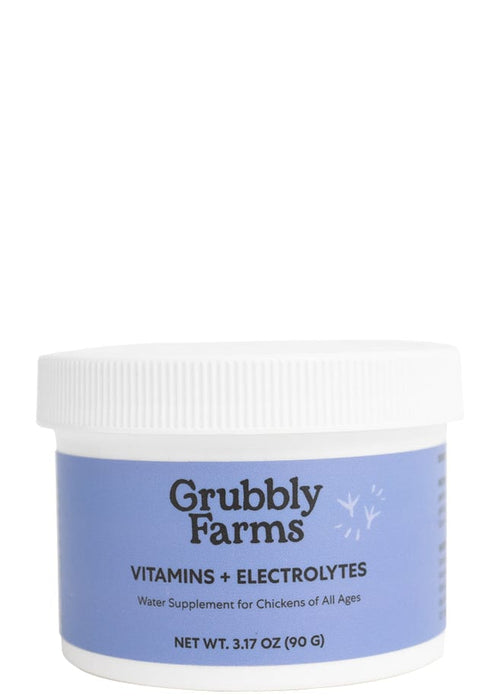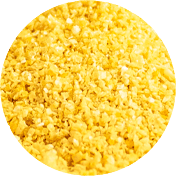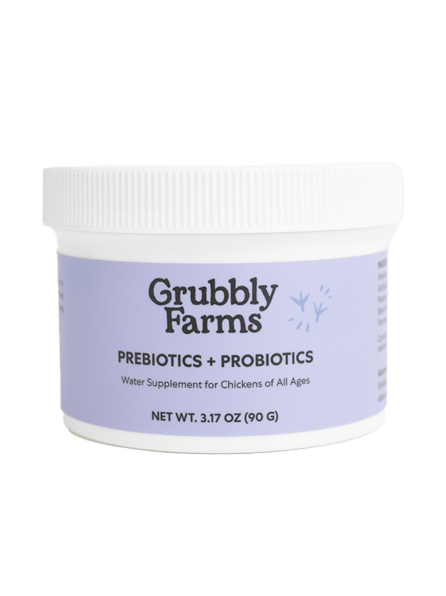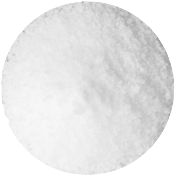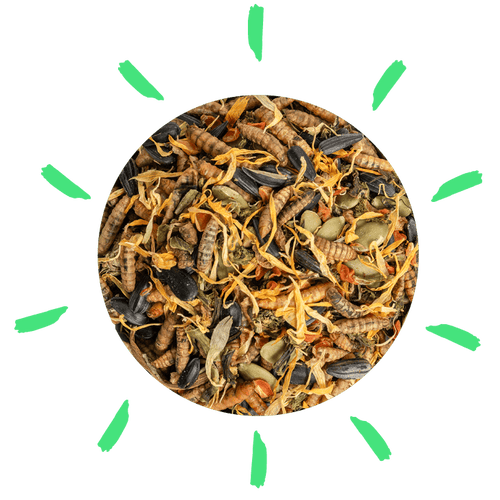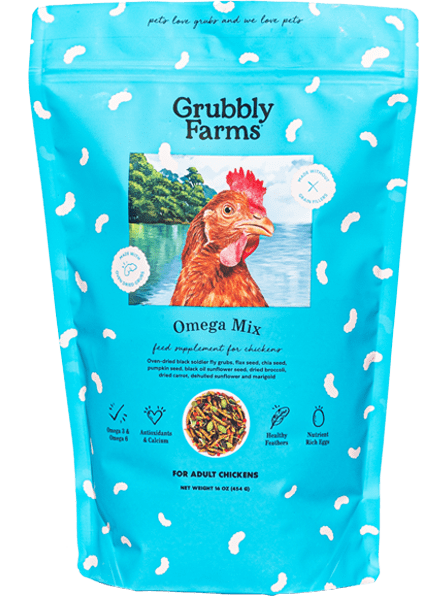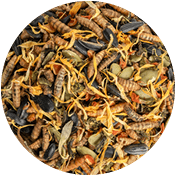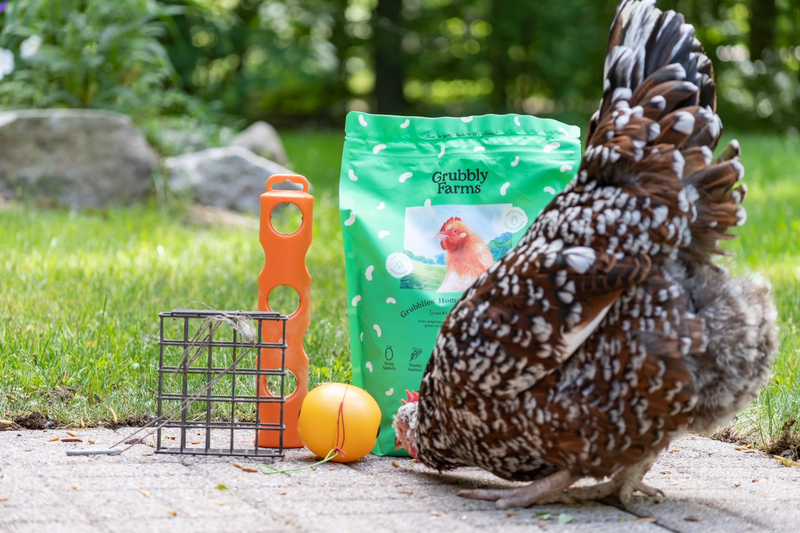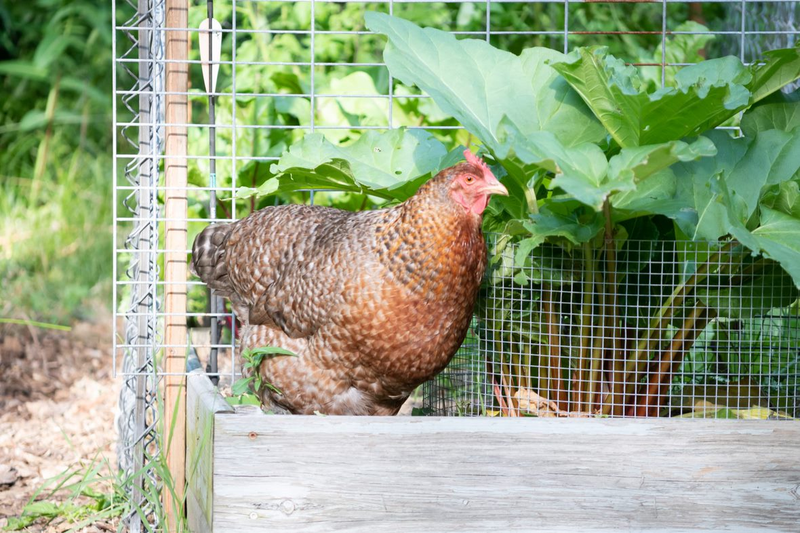Vitamins are an essential element in a chicken’s diet. Without vitamins, a chicken would become malnourished, stop laying, and be more susceptible to disease and parasites. Whether your flock is rural, suburban, or in an urban backyard, making sure they get the vitamins they need from sources in their diet—both daily and supplemental--is important for keeping them healthy and productive.

When to Consider Vitamin Supplements for Your Chickens
There are two main reasons you may want to provide a vitamin supplement to your flock: times of stress or a diluted daily diet.
Your flock’s main source of daily nutrition should come from a quality, well-balanced feed formulated specifically for layers, like Fresh Pecks; however, certain circumstances and stressors can still be good reason to supplement.
Vitamin Deficiency Caused by Environmental Stressors
Vitamin supplements can help prevent deficiencies when they are used at the right time. This can occur during times when a chicken decreases its feed intake or when environmental factors cause the body to become deficient in vitamins.
You may consider the following times to provide your flock with supplemental vitamins:
- Molting - Molting causes natural stress. While natural stress is not necessarily bad, it can cause a chicken to decrease its feed consumption or prevent vitamins from being absorbed properly during digestion.
- Stress - Any environmental factors that cause stress will inhibit the immune system from functioning properly. The immune system is important for fighting disease. Vitamins help support the immune system during times of stress. Some environmental stressors include heat stress, cold stress, new flock additions, switching coops and transportation, or a predator attack.
- Illness - Illness can cause a decrease in appetite, which leads a chicken to consume less vitamins. Also, some treatments for diseases can lead to vitamin deficiencies in which case a follow-up of supplemental vitamins would be beneficial. When a chicken is ill or has a decrease in appetite, they go to water first. A vitamin water supplement can provide what’s needed to prevent further illness and get it back to its regular diet.
Vitamin Deficiency Caused by Diluted Daily Diet
Using a low-quality feed or providing too many snacks can also result in vitamin deficiencies.
- Feed Ingredients - Ensure you are providing a high-quality feed specifically formulated for layers and keep an eye out for signs of deficiencies that may be a result of low-quality grains and fillers.
- Feed Quality - Your flock’s feed should always be fresh, not moldy, and not stale. Feed that is stale won’t provide your flock with the nutrition that they need.
- Responsible Treating - Treats and healthy snacks should not exceed 10%-20% of a chicken’s daily food intake (depending on the quality of the feed & snacks). Too many treats can add too much of a vitamin to the diet or detract from the nutrition your flock should be getting from their feed.
When evaluating your flock’s daily diet, it’s important to know what vitamins are the most important for chickens and how vitamins help keep them healthy.
Why Are Vitamins Important for Chicken Health?
Chickens need every known vitamin in small quantities to ensure proper growth, nutrition, reproduction, and immunity. Vitamins play an essential role in every body process, from the laying of an egg to fighting disease-causing pathogens. Chicks need vitamins to grow properly and mature into healthy adults. Once full-grown, chickens still need a daily supply of vitamins to stay healthy and productive, living up to their full potential for many happy years to come!
Specific vitamins help with these functions in a chicken’s body:
- Strong bone density
- Healthy Immune system
- Balanced gut health
- Clear, healthy eyes
- Proper egg production
- Prevents hemorrhaging
- Supports healthy metabolism
- Prevents nerve damage & paralysis
- Supports cell health
Unlike some dietary elements, like protein, a chicken’s vitamin needs to stay fairly constant throughout its entire life.
To understand when your flock or chicken may need a boost, it’s first important to understand how vitamins support chicken health and how to recognize potential deficiency. Each vitamin is interrelated to other ingredients in the feed, such as protein sources, minerals, and energy sources, which also contain vitamins naturally. A balanced diet is essential for making sure all the ingredients work together to provide the overall nutrition that a chicken needs daily.

The Essential Vitamins for Chickens
There are two main types of vitamins needed by chickens: fat-soluble vitamins and water-soluble vitamins. Because chickens typically go to water first when stressed, providing a vitamin supplement via their water source can help get them back on track and eating again, helping to prevent deficiencies or further illness.
Fat Soluble Vitamins
Fat-soluble vitamins are vitamins that can be stored in body fat. A chicken’s body will use the stored vitamins as they are needed. Since fat-soluble vitamins can be stored in body fat, an excess of these vitamins can lead to toxicity, also called hypervitaminosis.
While it’s true that a well-balanced diet should supply a chicken with all the fat-soluble vitamins it needs daily, a deficiency, called hypovitaminosis, can also occur when a chicken suffers from a decrease in appetite due to illness, heat stress, or other extreme stressors. Signs of excess or deficiencies can take a while to appear since fat-soluble vitamins are stored and used gradually.
Here are the important fat-soluble vitamins that must be in a chicken’s diet:
Vitamin A - Vitamin A is required for good vision health, proper growth, and strong bone-development. It is often called an anti-infection vitamin since it sustains the immune system and aids the body’s disease resistance, functioning as an antioxidant. Natural sources of vitamin A include green forage and cod liver oil.
Vitamin D - Vitamin D is necessary for the absorption of calcium in a hen’s body. Calcium is needed to make strong eggshells, bones, beaks, and claws. Both calcium and vitamin D must also be paired with phosphorus for proper absorption of all three dietary elements. A chicken can naturally synthesize vitamin D from exposure to the sun. Ensuring your flock has daily access to the outdoors can help them get natural vitamin D from their environment. Calcium supplements are a great way to fight a calcium deficiency or keep on hand in case you find soft eggshells.
Vitamin E - Vitamin E is an antioxidant. Antioxidants protect the body’s cells against free radicals that can cause diseases such as heart conditions and cancer. It is also needed for the normal functioning of the immune and reproductive systems. Vitamin E is closely linked to selenium and both must be present in the body for proper nutrition. Natural sources of vitamin E include cod liver oil, corn oil, soybean oil, wheat germ oil, meats, dairy, and leafy greens.
Vitamin K - Vitamin K is needed for normal blood clotting. When a chicken gets injured, the blood should clot quickly to prevent too much blood loss. Natural sources of vitamin K include leafy greens and alfalfa.
Water-soluble Vitamins
Water-soluble vitamins, on the other hand, are not stored in a chicken’s body. Instead, a chicken’s body only uses what is needed then expels the rest. Since these vitamins aren’t stored, they must be replenished more frequently than fat-soluble vitamins. An excess of these vitamins is less likely to be dangerous since the body expels any extra vitamins that aren’t needed. However, a deficiency is more likely to occur if these vitamins are not supplied on a regular basis by the chicken’s diet. A well-balanced chicken feed should supply your flock with the water-soluble vitamins they need on a daily basis; however, certain circumstances or stressors could be alleviated by a supplement
Here are the important water-soluble vitamins for chickens:
Vitamin B Complex - The vitamin B complex consists of eight known B-vitamins. The eight B-vitamins include:
- Thiamine (B1)
- Riboflavin (B2)
- Niacin (B3)
- Pantothenic Acid (B5)
- Pyridoxine (B6)
- Biotin (B7)
- Folate (B9)
- B12
Thiamine
Thiamine helps convert carbohydrates, fats, and proteins into energy that is usable by a chicken’s body. It is also needed for proper functioning of the brain and nervous system, and for healthy skin, feathers, beaks, claws, and eyes. Thiamine helps with healthy liver function as well. Natural sources of thiamine include meats, legumes, nuts, and seeds.
Riboflavin
Riboflavin is needed for synthesizing other B-vitamins and for converting foods into energy. If a chicken’s diet is lacking in a certain B-vitamin, the presence of riboflavin can help the body create the lacking B-vitamin from other dietary sources. Natural sources of riboflavin include leafy greens and dairy products.
Niacin
Like thiamine, niacin is needed for converting foods into energy. Niacin also ensures proper cell health. Most muscle meats are naturally rich in thiamine and can be a natural source of this B-vitamin in a chicken’s diet.
Pantothenic acid
Pantothenic acid is needed for coenzyme, protein, and fat creation. Natural sources of pantothenic acid include sunflower seeds, liver, and tuna.
Pyridoxine
Pyridoxine aids in amino acid (protein) metabolism. It also breaks down carbohydrates and fats and is needed for brain development and healthy immune function. Natural sources of pyridoxine include organ meats, fish, and chickpeas.
Biotin
Biotin is needed for proper feather, skin, and nail health. It aids in breaking down carbohydrates, fats, and protein. Biotin also helps keep the body’s cells healthy and working properly. Natural sources of biotin include muscle meats, organ meats, fish, and sunflower seeds.
Folate
Folate helps with proper reproductive health (think egg laying), and it helps the digestive system metabolize vitamins and amino acids. Amino acids are found in protein sources in a chicken’s diet. Folate can be naturally found in dark leafy greens, liver, eggs, and various nuts.
Vitamin B12
Vitamin B12 is important since it is needed for creating new red blood cells and maintaining healthy brain and neurological functions. B12 also helps the digestive system metabolize fats and proteins in a chicken’s diet. It can naturally be found in muscle meats, organ meats, and dairy products.
Vitamin C
Vitamin C is the other water-soluble vitamin that is important in a chicken’s diet. It acts as an antioxidant by preventing disease and reducing the harmful effects of stress on a chicken’s immune system. Chickens can naturally synthesize vitamin C from other vitamins in their diet. However, foods rich in vitamin C can also help add this vitamin to a chicken’s diet. Vitamin C rich foods include raw pumpkin and winter squashes, sweet potatoes, and dark leafy greens.
Symptoms and Vitamin Deficiencies
Every vitamin plays an important role in keeping a chicken healthy. Some vitamins share responsibilities; however, each vitamin also has its own specific function. A deficiency in a certain vitamin can often lead to symptoms related to its integral role in a chicken’s overall health.
Skin & Feather Health - Thiamine and biotin are two vitamins that help a chicken maintain healthy feathers and skin. A deficiency in these B-vitamins can cause an increase in feather pecking, feather loss, and feather eating. Ensuring your flock’s diet supplies thiamine and biotin can help your chickens have healthy feathers and prevent poor feather quality.
Immune System Support - Vitamin A, vitamin E, and pyridoxine are several vitamins that are responsible for helping a chicken maintain a strong immune system. The immune system is the body’s way of fighting disease. It is often suppressed during times of stress and illness since it is the first place that energy is directed away from. Vitamins A & E and pyridoxine are important during extreme weather, diet changes, flock additions, or times of travel since those factors can cause stress.
Bone & Skeletal Health - There are many vitamins that help a chicken have a strong bone and skeletal structure. Vitamin A, vitamin D, thiamine, pantothenic acid, and biotin all help with healthy bone development and maintenance. Chicks especially need these vitamins as they grow because bone development is occurring more rapidly.
Vitamin D is an important vitamin that pairs with phosphorus to ensure that a chicken’s body can metabolize and use calcium supplied by the diet. Calcium is needed for proper bone development, skeletal health, and eggshell formation. A deficiency in calcium, vitamin D, or phosphorus can lead to thin-shelled eggs, rickets, and other skeletal deformities.
Egg Production - Vitamin D, vitamin E, and folate play an important role in reproductive health, or egg production in hens. A lack of these vitamins can cause a drop in laying or an increase in laying related ailments, such as egg binding. Egg quality can also decrease if a chicken’s diet is deficient in any one vitamin since an egg naturally contains all the vitamins needed for a fertilized egg to develop a healthy embryo.

Conclusion
Chickens need every essential vitamin in order to stay healthy and productive. Vitamins help keep the immune system strong during times of stress, they ensure proper bone growth and maintenance, they support a healthy reproductive system, and they are needed for maintaining healthy skin and feathers. If you are ever unsure if your flock is getting the nutrition they need, make sure you consult a veterinarian or avian expert. Feeding your chickens a balanced diet and using supplemental vitamins when needed can help keep your flock happy and healthy!





